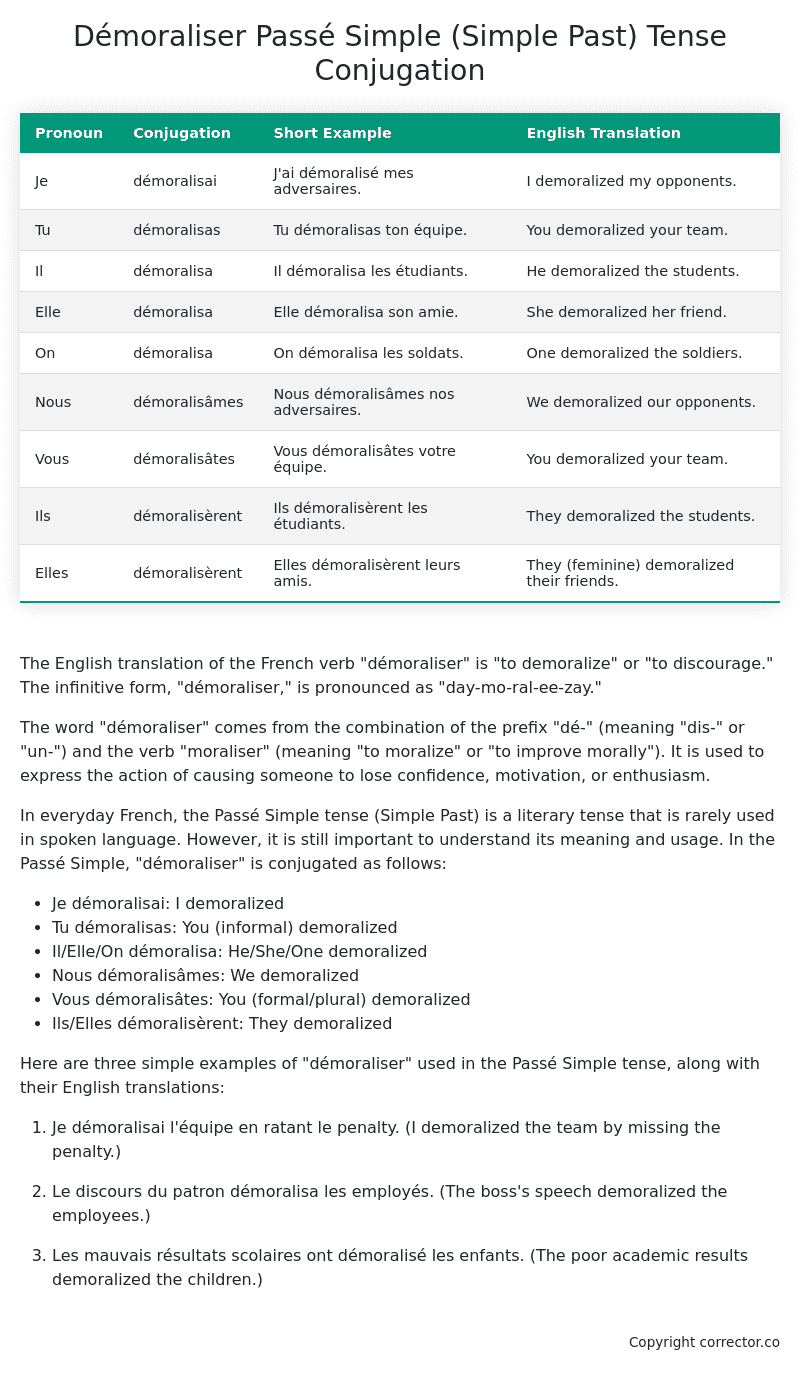Passé Simple (Simple Past) Tense Conjugation of the French Verb démoraliser
Introduction to the verb démoraliser
The English translation of the French verb “démoraliser” is “to demoralize” or “to discourage.” The infinitive form, “démoraliser,” is pronounced as “day-mo-ral-ee-zay.”
The word “démoraliser” comes from the combination of the prefix “dé-” (meaning “dis-” or “un-“) and the verb “moraliser” (meaning “to moralize” or “to improve morally”). It is used to express the action of causing someone to lose confidence, motivation, or enthusiasm.
In everyday French, the Passé Simple tense (Simple Past) is a literary tense that is rarely used in spoken language. However, it is still important to understand its meaning and usage. In the Passé Simple, “démoraliser” is conjugated as follows:
- Je démoralisai: I demoralized
- Tu démoralisas: You (informal) demoralized
- Il/Elle/On démoralisa: He/She/One demoralized
- Nous démoralisâmes: We demoralized
- Vous démoralisâtes: You (formal/plural) demoralized
- Ils/Elles démoralisèrent: They demoralized
Here are three simple examples of “démoraliser” used in the Passé Simple tense, along with their English translations:
-
Je démoralisai l’équipe en ratant le penalty.
(I demoralized the team by missing the penalty.) -
Le discours du patron démoralisa les employés.
(The boss’s speech demoralized the employees.) -
Les mauvais résultats scolaires ont démoralisé les enfants.
(The poor academic results demoralized the children.)
Table of the Passé Simple (Simple Past) Tense Conjugation of démoraliser
| Pronoun | Conjugation | Short Example | English Translation |
|---|---|---|---|
| Je | démoralisai | J’ai démoralisé mes adversaires. | I demoralized my opponents. |
| Tu | démoralisas | Tu démoralisas ton équipe. | You demoralized your team. |
| Il | démoralisa | Il démoralisa les étudiants. | He demoralized the students. |
| Elle | démoralisa | Elle démoralisa son amie. | She demoralized her friend. |
| On | démoralisa | On démoralisa les soldats. | One demoralized the soldiers. |
| Nous | démoralisâmes | Nous démoralisâmes nos adversaires. | We demoralized our opponents. |
| Vous | démoralisâtes | Vous démoralisâtes votre équipe. | You demoralized your team. |
| Ils | démoralisèrent | Ils démoralisèrent les étudiants. | They demoralized the students. |
| Elles | démoralisèrent | Elles démoralisèrent leurs amis. | They (feminine) demoralized their friends. |
Other Conjugations for Démoraliser.
Le Present (Present Tense) Conjugation of the French Verb démoraliser
Imparfait (Imperfect) Tense Conjugation of the French Verb démoraliser
Passé Simple (Simple Past) Tense Conjugation of the French Verb démoraliser (You’re reading it right now!)
Passé Composé (Present Perfect) Tense Conjugation of the French Verb démoraliser
Futur Simple (Simple Future) Tense Conjugation of the French Verb démoraliser
Futur Proche (Near Future) Tense Conjugation of the French Verb démoraliser
Plus-que-parfait (Pluperfect) Tense Conjugation of the French Verb démoraliser
Passé Antérieur (Past Anterior) Tense Conjugation of the French Verb démoraliser
Futur Antérieur (Future Anterior) Tense Conjugation of the French Verb démoraliser
Subjonctif Présent (Subjunctive Present) Tense Conjugation of the French Verb démoraliser
Subjonctif Passé (Subjunctive Past) Tense Conjugation of the French Verb démoraliser
Subjonctif Imparfait (Subjunctive Imperfect) Tense Conjugation of the French Verb démoraliser
Conditionnel Présent (Conditional Present) Tense Conjugation of the French Verb démoraliser
Conditionnel Passé (Conditional Past) Tense Conjugation of the French Verb démoraliser
Conditionnel Passé II (Conditional Past II) Tense Conjugation of the French Verb démoraliser
L’impératif Présent (Imperative Present) Tense Conjugation of the French Verb démoraliser
L’impératif Passé (Imperative Past) Tense Conjugation of the French Verb démoraliser
L’infinitif Présent (Infinitive Present) Tense Conjugation of the French Verb démoraliser
L’infinitif Passé (Infinitive Past) Tense Conjugation of the French Verb démoraliser
Le Participe Présent (Present Participle) Tense Conjugation of the French Verb démoraliser
Le Participe Passé (Past Participle) Tense Conjugation of the French Verb démoraliser
Struggling with French verbs or the language in general? Why not use our free French Grammar Checker – no registration required!
Get a FREE Download Study Sheet of this Conjugation 🔥
Simply right click the image below, click “save image” and get your free reference for the démoraliser Passé Simple tense conjugation!

Démoraliser – About the French Passé Simple (Simple Past) Tense
Formation
Usage
Narration
Historical Context
Interactions with other tenses
Passé Composé
Imparfait
Conditional and Subjunctive
Summary
I hope you enjoyed this article on the verb démoraliser. Still in a learning mood? Check out another TOTALLY random French verb conjugation!


